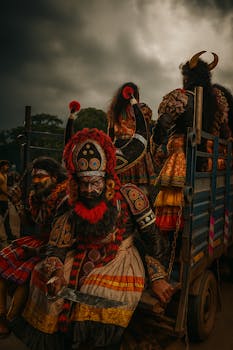Discover the Best AI Tool for Song Lyrics: Your Creative Companion
Feeling that songwriting spark but struggling to find the right words? You’re not alone. The journey from a melody in your head to a fully-formed song can be a winding one, often hitting a roadblock at the lyric-writing stage. What if there was a way to unlock your lyrical potential, to brainstorm ideas faster, and to polish your verses until they shine? In this post, we’re diving deep into the exciting world of artificial intelligence and uncovering the best AI tool for song lyrics that can help you do just that. We’ll explore what these tools are, how they work, and how you can leverage them to elevate your songwriting to new heights. Get ready to discover your new creative partner!
Unleashing Your Inner Lyricist with AI
Songwriting is a deeply personal and often emotional process. For many, the challenge isn’t a lack of inspiration, but rather the difficulty in translating that inspiration into coherent, impactful lyrics. Whether you’re a seasoned musician looking for a fresh perspective or a budding songwriter taking your first steps, the blank page can be intimidating. This is where the magic of AI steps in. AI tools are rapidly evolving, and their ability to generate creative text, including song lyrics, is nothing short of remarkable. They can act as a powerful brainstorming partner, helping you overcome writer’s block, explore different themes and styles, and even suggest rhyming patterns and vocabulary you might not have considered. Let’s explore how these technological marvels are revolutionizing the art of lyric writing.
The Evolution of AI in Creative Writing
Artificial intelligence has come a long way from simply performing complex calculations. Today, AI can write poetry, craft compelling narratives, and, yes, even pen song lyrics. These sophisticated algorithms are trained on massive datasets of existing text, including countless songs across genres and eras. By analyzing patterns, vocabulary, and thematic structures, AI can learn to mimic human creativity and generate original content.
When we talk about the best AI tool for song lyrics, we’re not just talking about a glorified rhyming dictionary. These tools can:
- Generate lyrics based on a theme or mood: You can input keywords like “heartbreak,” “celebration,” or “adventure,” and the AI will weave them into lyrical narratives.
- Suggest rhymes and near rhymes: Going beyond simple AABB patterns, AI can offer creative rhyming options that fit your meter and meaning.
- Explore different song structures: Need a chorus that pops or a bridge that adds a new dimension? AI can help you structure your song effectively.
- Provide lyrical variations: Stuck on a particular line? The AI can offer multiple ways to express the same idea, giving you choices.
- Assist with genre-specific styles: Want to write a country ballad or a hip-hop anthem? Some AI tools can tailor their output to specific genres.
The relevance of these tools today is undeniable. In a world where content creation is king, and artists are constantly seeking ways to streamline their workflow, AI offers an invaluable advantage. It democratizes the songwriting process, making it more accessible and less daunting for a wider range of individuals.

Top Contenders: Exploring the Best AI Tool for Song Lyrics
Navigating the landscape of AI lyric generators can be overwhelming. Several excellent options are available, each with its unique strengths. While it’s subjective to declare a single “best” AI tool for song lyrics, as preferences vary, we can highlight some of the most popular and effective platforms that consistently receive high marks from users.
1. ChatGPT by OpenAI
While not exclusively designed for lyrics, ChatGPT is incredibly versatile. Its natural language processing capabilities are top-notch, allowing it to generate creative text in response to detailed prompts. You can ask it to write lyrics in the style of a specific artist, explore a particular emotion, or even incorporate specific phrases.
Tips for using ChatGPT:
- Be specific with your prompts: Instead of “write a song,” try “write a melancholic folk song about lost love, with a chorus that repeats the phrase ‘the echo of your voice’.”
- Iterate and refine: Don’t expect perfection on the first try. Ask ChatGPT to revise, expand, or change certain lines.
- Use it for brainstorming: Generate a list of themes, metaphors, or rhyming words related to your topic.
ChatGPT’s strength lies in its conversational nature, making it feel like a collaborative partner. You can discuss your ideas with it, much like you would with a human co-writer.
2. Rytr
Rytr is an AI writing assistant that offers a dedicated “Song Lyrics” use case. It’s known for its user-friendly interface and ability to generate high-quality content quickly. You can select a tone, provide a few keywords, and Rytr will produce lyrical snippets.
Benefits of Rytr:
- Ease of use: Its straightforward interface makes it accessible for beginners.
- Multiple tones: Choose from a variety of tones to match your song’s mood.
- Speed: Generates content rapidly, perfect for quick inspiration.
Rytr excels at providing concise and relevant lyrical ideas that can spark your creativity.

3. Jasper.ai (formerly Jarvis)
Jasper is a powerful AI content generator that can be adapted for songwriting. It offers various templates and writing modes, including ones that can be steered towards lyric creation. Its advanced AI models allow for more nuanced and creative outputs.
Key features of Jasper:
- Boss Mode: Allows for more command-line style prompting for greater control.
- Templates: Offers pre-built frameworks that can be adapted for song lyrics.
- Integrations: Works with other tools to enhance workflow.
Jasper is ideal for those who want a more robust AI writing tool and are willing to invest a bit more time in learning its capabilities to achieve truly unique lyrical outputs.
4. Sudowrite
Sudowrite is specifically designed for fiction writers, but its “Describe,” “Brainstorm,” and “Rewrite” features can be incredibly useful for lyricists. It helps you flesh out imagery, explore different word choices, and overcome descriptive hurdles.
How Sudowrite aids lyricists:
- Sensory details: Use the “Describe” feature to generate vivid descriptions that can be incorporated into your lyrics.
- Word association: “Brainstorm” can help you find synonyms, related concepts, and metaphorical language.
- Rhyme and rhythm: While not its primary focus, its ability to suggest descriptive language can indirectly help with rhyme and rhythm.
Sudowrite is excellent for adding depth and imagery to your existing lyrical ideas.
5. LyricStudio
LyricStudio is one of the few AI tools explicitly built for songwriters. It provides a dedicated platform for lyric generation, focusing on helping you write original lyrics quickly. It’s designed to be a songwriting assistant, not a replacement for your own voice.
Unique aspects of LyricStudio:
- Rhyme suggestions: It offers intelligent rhyme suggestions that fit the context of your lines.
- Line generation: You can provide a line, and LyricStudio will suggest continuations or variations.
- Theme-based generation: Input a theme, and it will generate relevant lyrical ideas.
LyricStudio aims to be the best AI tool for song lyrics by directly addressing the needs of songwriters with features tailored to the craft.

Real-World Applications and Creative Workflow Integration
Integrating AI tools into your songwriting process isn’t about letting the machine do all the work. It’s about using AI as a catalyst for your own creativity. Think of it as a co-writer who never sleeps and has read every song ever written.
Case Study: The Pop Ballad Breakthrough
Sarah, a singer-songwriter, was struggling with the chorus of a new pop ballad. She had the melody and a general idea about overcoming adversity, but the words felt cliché. She used Rytr to generate several chorus options based on keywords like “strength,” “resilience,” and “new beginnings.” One of Rytr’s suggestions, “Rising from the ashes, finding my new dawn,” provided the perfect hook. Sarah then used ChatGPT to brainstorm bridge lyrics that expanded on this theme, asking for metaphors related to light and darkness. The iterative process of generating, selecting, and refining with AI helped her break through her writer’s block and complete a powerful song.
Expert Opinion:
Renowned music producer, Alex Chen, often advises aspiring artists to experiment with AI tools. “AI can be a fantastic springboard for ideas,” he says. “It helps you see possibilities you might not have considered. The key is to always infuse your own emotion and personal narrative. Use AI to get the raw material, then mold it into something uniquely yours.” For more on how technology is shaping music, check out this ai-music-generation-tools”>AI music generation tools. The goal is to enhance your workflow, not replace your artistry.
Pros and Cons of AI Lyric Generators
| Pros | Cons |
|---|---|
| ➕ Overcomes writer’s block quickly | ➖ Can sometimes produce generic or cliché lyrics |
| ➕ Generates a vast array of ideas and perspectives | ➖ Lacks genuine human emotion and personal experience |
| ➕ Excellent for brainstorming rhymes and vocabulary | ➖ Requires careful editing to ensure originality and artistic voice |
| ➕ Speeds up the songwriting process significantly | ➖ May not always grasp nuanced emotional or thematic subtleties |
| ➕ Accessible for beginners, lowering the barrier to entry | ➖ Potential for over-reliance, hindering personal skill development |
Finding Your Best AI Tool for Song Lyrics
The “best” AI tool for song lyrics is ultimately the one that resonates most with your personal songwriting style and workflow. Whether you prefer the conversational flexibility of ChatGPT, the user-friendly templates of Rytr, the advanced capabilities of Jasper, the descriptive power of Sudowrite, or the dedicated focus of LyricStudio, each offers a unique path to enhancing your lyrical creation process.
Remember, AI is a tool. It’s a powerful assistant designed to augment your creativity, not to replace it. By understanding its capabilities and limitations, you can harness its potential to break through creative blocks, explore new lyrical avenues, and bring your musical ideas to life with greater ease and inspiration. So, don’t be afraid to experiment. Dive in, try out a few different options, and discover which AI partner helps you craft the most compelling stories and melodies. Happy songwriting!